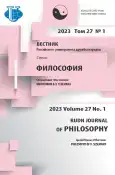Fundamentalism: a Religious Cognitive Bias? A Philosophical Discourse of Religious Fundamentalism
- 作者: Lemanto E.1
-
隶属关系:
- Peoples’ Friendship University of Russia (RUDN University)
- 期: 卷 27, 编号 1 (2023): PHILOSOPHY OF V. SESEMANN
- 页面: 163-174
- 栏目: SCIENCE, PHILOSOPHY, RELIGION
- URL: https://journal-vniispk.ru/2313-2302/article/view/325287
- DOI: https://doi.org/10.22363/2313-2302-2023-27-1-163-174
- EDN: https://elibrary.ru/RILOJC
- ID: 325287
如何引用文章
全文:
详细
Fundamentalism has been widely reckoned as one among many other watchful social phenomena currently. There are two general approaches to it. The first is from those who perceive fundamentalism as a movement of militant piety found almost in any religion, and therefore fundamentalism cannot necessarily be identified with a violent movement. The second is from those who categorize fundamentalism as a political movement with an objective of worldly power, and therefore it is susceptible to turning into a violent movement. In investigating the two views closely, I attempt to put forward a couple of hypothetical inquiries. Is fundamentalism a common phenomenon and common feature found in almost any religion? The answer is yes. Is fundamentalism identical to violent movement? The answer is no. Is fundamentalism then impossibly and utterly unrelated to violent movements? The answer is no. If fundamentalism is unidentical with violent movements but not a few fundamentalists can also turn to be perpetrators of what is called religious violence or violence in the name of religion, then what arguments can be set forth to ensure that fundamentalism cannot be overlooked anymore as one among many other major social problems of our age? This article aims to examine fundamentalism through epistemological and axiological criticism, and to investigate that to a certain range fundamentalism is a form of religious cognitive and behavioral bias, and both as a militant piety and as a political movement fundamentalism should at best be approached from their interplayed relation.
作者简介
Eduardus Lemanto
Peoples’ Friendship University of Russia (RUDN University)
编辑信件的主要联系方式.
Email: lemanto@yahoo.com
Doctoral Student, Department of Social Philosophy 6, Miklukho-Maklaya St., Moscow, 117198, Russian Federation
参考
- Tibi B. The Challenge of Fundamentalism. Berkeley: University of California Press; 1998.
- Barr J. Escaping from Fundamentalism. London: SCM Press; 1984.
- Grand S. What is Religious Fundamentalism? 2012 Feb 22. Available from: https://www.brookings.edu/events/what-is-religious-fundamentalism/ (accessed: 25.05.22).
- Armstrong K. Battle for God. New York: Alfred A. Knopf; 2000.
- Maarif AS. Politik Identitas dan Masa Depan Pluralisme Kita. Jakarta: PUSAD Yayasan Wakaf Paramadina; 2010.
- Weinberg L, Pedahzur A. Religious Fundamentalism and Political Extremism. Portland: Frank Cass Publisher; 2004.
- Marcovitz H. Religious Fundamentalism. San Diego: ReferencePoint Press; 2010.
- Wood RW, Hill PC, Williamson WP. The Psychology of Religious Fundamentalism. New York, London: The Guilford Press; 2005.
- Schirrmacher T. Fundamentalism: When Religion becomes Dangerous. Bonn: Verlag fur Kultur and Wissenschaft-Culture and Science Publication; 2013.
- Murphy N. Beyond Liberalism and Fundamentalism: How Modern and Postmodern Philosophy Set the Theological Agenda. Harrisburg-Pennsylvania: Trinity Press International; 2007.
- Phillips DZ. Wittgenstein and Religion. New York: Palgrave Macmillan; 1993.
- Plant B. Wittgenstein, Religious “Passion” and Fundamentalism. The Journal of Religious Ethics. 2013;41(2):280-309. https://doi.org/10.1111/jore.12014
- Adam RM. Kierkegaard’s Arguments Against Objective Reasoning in Religion. The Monist - Philosophy and Religion in the 19th Century. 1977;60(2):228-243. https://doi.org/10.5840/monist19776023
- Amman M, Meloy JR. Stochastic Terrorism: A Linguistic and Psychological Analysis. Perspectives on Terrorism. 2021;15(5):2-13.
- Singh J. The Emir of Katibah Nusantara: Bahrumsyah. Journal of Counter Terrorist Trends and Analyses. 2016;8(11):4-7.
- Singh B. The Revival of Al Qaeda’s Affiliate in Southeast Asia: the Jemaah Islamiyah. Journal of Counter Terrorist Trends and Analyses. 2017;9(5):5-8.
补充文件









